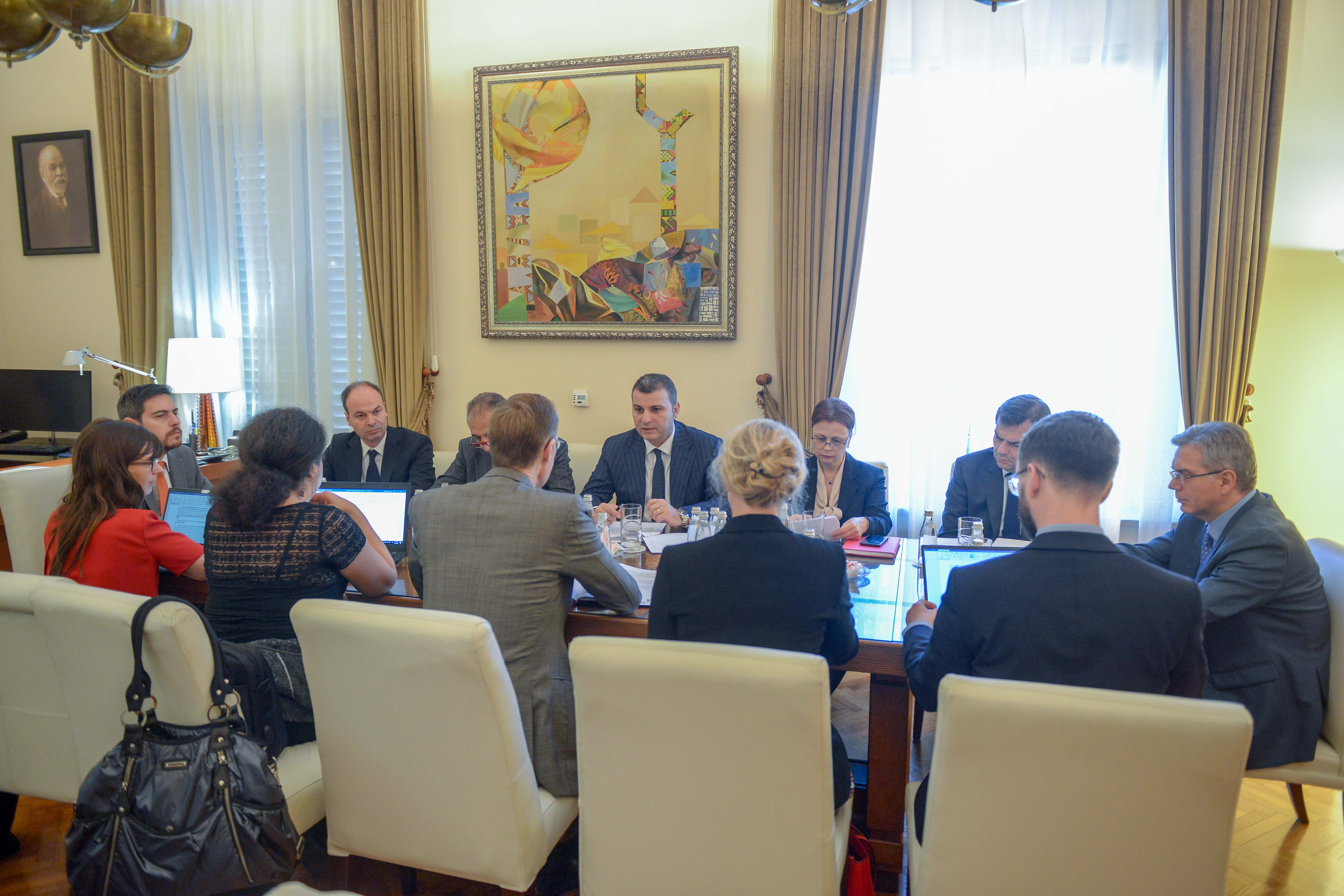BANK OF ALBANIA
PRESS RELEASE
On Article IV consultations with the IMF Mission
Publication date: 26.11.2019
The Bank of Albania thanks the IMF Mission for the fruitful discussions over the last two weeks, in the framework of Article IV consultations.
Overall, the Bank of Albania and the IMF share similar views on:
- The importance of maintaining economic and financial stability in the country, as a precondition for sustainable and long-term growth; and,
- The need for intensifying structural reforms, as the only instrument for accelerating the pace of economic growth and for a rapid and full convergence with European Union countries.
In the following, is a more detailed description of our view on: the current situation of the economy and financial system in Albania; the development perspective; the policies and structural reforms that are needed for supporting them.

The Albanian economy experienced a slowdown of growth rates in the first half of 2019. The analysis of the available data shows that the slowdown was dictated mainly by temporary supply-side shocks. Yet, the intensity of their effect illustrates the need for a better diversification of sources of growth in the future.
From the perspective of aggregate demand, the expansion of economic activity reflected the increase of both private consumption and revenues from tourism. On the other hand, the volume of exports fell and the rise in investments has started to feel the effects from the gradual completion of the TAP project. The structure of aggregate demand expansion is reflected in the structure of growth by sector. Thus, the services sector continued to grow, whereas the industry and construction sectors showed a more moderate performance.
The Bank of Albania deems that, notwithstanding the slowdown, economic and financial stability indicators for Albania remain solid. Thus:
- Employment and wages have increased, while the unemployment rate hit its historical minimum, standing at 11.5%, in the second quarter. The further growth of employment and wages is expected to build up domestic inflationary pressures and support the convergence of inflation to the target.
- The external position of the economy has improved. While the balance of payments deficit expanded in the first half of the year, the external debt of Albania fell to 62% of the GDP in the second quarter, against 75% of the GDP in 2016.
- Budget deficit remains controlled and public debt is downward, albeit fiscal vulnerabilities remain.
- The banking sector is profitable, and its liquidity and capitalisation indicators stand above regulatory requirements. Notably, the ratio of non-performing loans has dropped to 10.6% of the portfolio. Credit risk reduction and banking sector consolidation create the premises for a faster growth of credit in the future.
- Lastly, balance sheets of the private sectoral, firms and households show improvement.
This performance has reflected, among other things, the contribution of the monetary policy and macro-prudential measures undertaken by the Bank of Albania.
- Monetary stimulus has contributed to lowering the interest rates, bolstering credit growth and reduction of debt servicing costs for firms and households. Thus, the monetary policy has contributed to the expansion of households’ consumption, which has created further premises for the employment and wages growth and the return of inflation to target.
- In parallel, the prudent supervision and regulation of the banking sector have induced the improvement of its balance sheet health, reduced risks to banking activity, making provisions for strengthening the intermediary role of this sector in the future.
The Bank of Albania deems that economic growth will be improving in the medium term, but risk factors are skewed to the down side. These risks are related to a potential worsening in the external environment, and a potential continuation of supply-side shocks, tensioned political climate, and the pace of structural reforms realisation in Albania.
Related to the above, the Bank of Albania judges that policies for the country's economic management should continue to be oriented toward guaranteeing Albania's economic stability and reducing risks. In greater detail:
- The monetary policy will continue to maintain its accommodative stance throughout the medium-term horizon, providing the necessary support for economic growth and the return of inflation to target.
- The fiscal policy should continue to be oriented toward continuing fiscal consolidation and reducing public debt. In parallel, public finances should continue to be engaged for reducing fiscal vulnerabilities, through:
- Continuing efforts for increasing formalisation and sustainably decreasing fiscal evasion;
- Improving further managing capabilities and the structure of public debt;
- Monitoring the performance of social and health insurance schemes, aiming to guarantee their long-term stability; and
- Careful supervision of PPP programmes, aiming to minimise contingency liabilities on the state budget.
In parallel, with prudent monetary and fiscal policies, Albania should speed up its efforts for implementing structural reform. Among others, the reform should aim at:
- Improving the business environment, with a view to boosting domestic and foreign investments;
- Boosting competitiveness, promoting know-how, innovation and improving managerial competencies, with a view to enhancing the efficiency of Albania’s competitiveness.
- Comprehensive improvement of infrastructure and further opening of markets, with a view to reducing costs and increasing profitability; and,
- Continuing the approximation of legislation and economic policies with European Union ones, with a view to reducing the perceived risk for the country.
The Bank of Albania remains committed to improving further the financial system, in cooperation with other relevant regulatory agencies. Priority aspects include:
- Improving financial markets and payment systems functioning;
- Stimulating further crediting, through the Platform for Credit Recovery in Albania, launched in cooperation with the Albanian Association of Banks.
- Continuing the work for reducing non-performing loans and further approximation of our supervisory and regulatory frameworks with ESCB standards and Basel principles.

 Twitter
Twitter
 Youtube
Youtube
 Facebook
Facebook
 Flickr
Flickr
 RSS
RSS
 Subscribe
Subscribe
 Feedback
Feedback